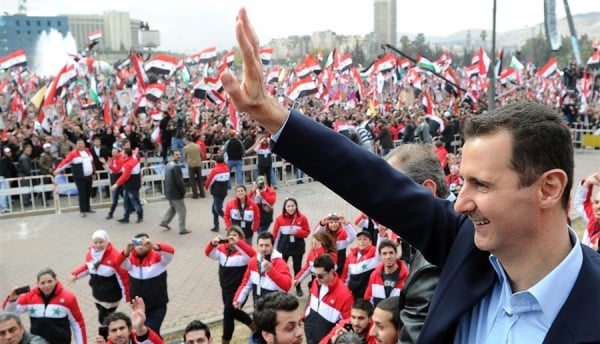
There is a good rule taught in newsrooms early in one’s reporting life that goes along the lines of why one should listen to so-called crazy people. It is because, sometimes, they actually say the truth.
By dint of luck or perhaps true insight, Syrian President Bashar al-Assad has stumbled into that equation. He warned that the U.S. support for Syrian rebels would result in another bastion of Al Qaeda terrorists – should the rebels somehow manage to win, of course.
“The West paid heavily for funding al Qaeda in its early stages in Afghanistan. Today it is supporting it in Syria, Libya and other places, and will pay a heavy price later in the heart of Europe and the United States,” he told al-Ikhbariya channel.
http://uk.reuters.com/article/2013/04/17/uk-syria-conflict-assad-idUKBRE93G0ZP20130417
Not satisfied by making one cogent point, win, Assad then went on to suggest that the U.S. should switch sides and join with him since his government is the best hope for the Syrian people. And then a few days later, he used chemical weapons on some of those Syrian people. How he thought that might aid is argument remains, well, more on the crazy than cogent side.
What is new is that the U.S. has increased its focus on aiding some elements of the Syrian opposition. Secretary of State John Kerry – showing his years of knowing the world and its players – continues to craft a plan to provide increased support to targeted entities.
Kerry, attending a conference in Turkey of the coalition and its 11 main foreign supporters, announced a doubling of non-lethal U.S. assistance to $123 million. Some of that reportedly will be supplies of night-vision equipment, armored vehicles, body armor and radios to the group’s military wing.
The NATO alliance also has deployed missile-defense batteries in neighboring Turkey to dissuade Assad from attacking Syrian rebel bases and refugee camps there. In addition, the U.S. decided to send 200 troops to Jordan in the coming weeks to boost defenses in the face of the worsening conflict in neighboring Syrian, a Jordanian cabinet minister said.
http://uk.reuters.com/article/2013/04/17/uk-syria-crisis-jordan-usa-idUKBRE93G14920130417
Yet Assad’s point of sleeping with the wrong enemy still is a top concern. The U.S., France, Britain and others face a Hobson’s choice; they cannot support elements of the Syrian opposition that may have Al-Qaeda ties, which sadly have been the most successful fighting force taking on Assad.
That extremist force also makes Assad look prophetic – he once spoke of “ten Afghanistans” in Syria once outside elements and extremists enter the fight. The Assad regime will say it has been proven right, as will Russia, China and Hezbollah
In addition, it divides Syria’s political opposition even more. An Al Qaeda group on the battlefield creates a quandary for other rebel groups: Do they bed down with these well-organized extremists or continue the lonely fight?
Under the “no good options” umbrella comes the chemical weapons moment.
U.S. intelligence has concluded “with some degree of varying confidence,” that the Syrian government has used sarin gas as a weapon, Defense Secretary Chuck Hagel said. President Obama has said the use of chemical weapons would be a “game-changer” in the U.S. position on intervening in the Syrian civil war, and the letter to Congress reiterates that the use or transfer of chemical weapons in Syria is a “red line for the United States.” However, the letter also hints that a broad U.S. response is not imminent.
Despite a lack of conclusive evidence, the U.S. intelligence assessments that the Syrian regime has used chemical weapons on a small scale intensified pressure on President Obama to give yet more help to rebels fighting Assad. And that goes back to the Hobson’s choice.
“This is a case where there is nothing but bad options,” said Anthony Cordesman, an expert with the Center for Strategic and International Studies.
Randa Slim of the Middle East Institute said Obama must take some kind of action or risk large-scale regime chemical attacks on opposition enclaves that Assad’s forces appear to be carving out around Damascus, the city of Homs and the border with Lebanon.
If Obama doesn’t “do something now,” she said, “we will see Assad upping the ante and using CW (chemical warfare) on a larger scale.” She agreed that Obama’s choices are “between bad and worse.”
Cordesman warned that sending U.S. special forces into Syria to destroy the regime’s chemical weapons stocks before they could be stolen or used in major attacks is too risky and would likely end in disaster. “It’s a great movie, but that’s where it ends,” he said.
That’s not the movie anyone thinks will be made.
(Photo credit: MSNBC Media)